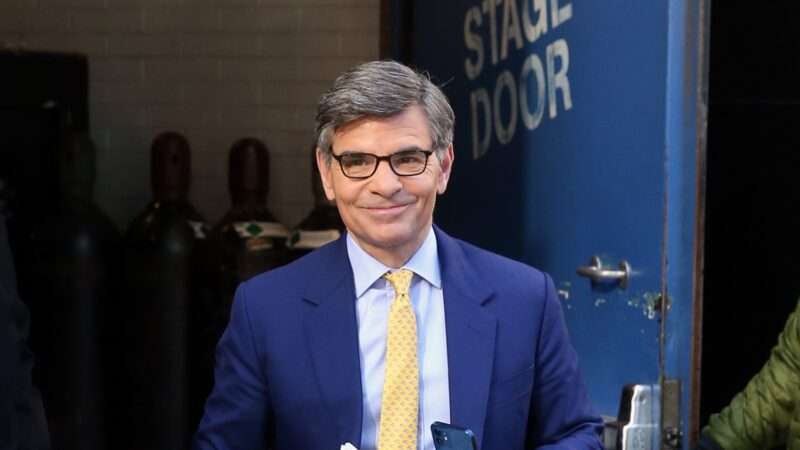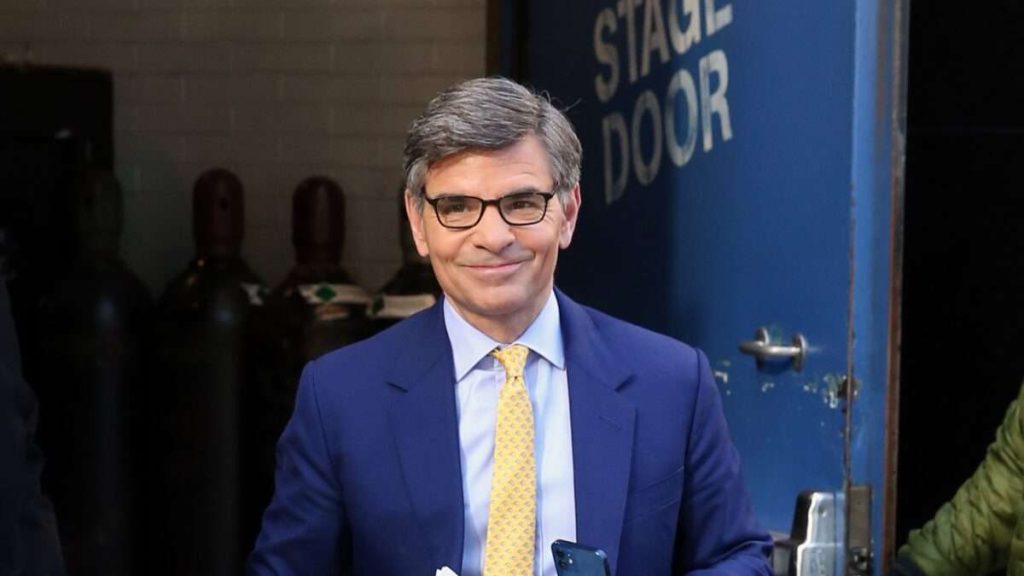
In an interview with Rep. Nancy Mace (R–S.C.) on ABC’s This Week last March, host George Stephanopoulos repeatedly and inaccurately asserted that Donald Trump, now the president-elect, had been “found liable for rape.” A week later, Trump sued ABC and Stephanopoulos for defamation in the U.S. District Court for the Southern District of Florida, noting that a jury had deemed Trump civilly liable for “sexual abuse,” not “rape.” Over the weekend, ABC News announced that it had reached a $15 million settlement with Trump in the form of a $15 million contribution to Trump’s presidential library. ABC also agreed to cover $1 million in Trump’s legal expenses.
The settlement is highly unusual in the annals of Trump’s many lawsuits against news outlets, which typically feature claims with a much weaker legal and empirical basis. Some Trump critics explicitly or implicitly faulted ABC for folding, saying its decision is apt to have a chilling impact on journalism. But any such threat can be mitigated by applying normal standards of journalistic care—standards that Stephanopoulos conspicuously failed to uphold in this case.
In his interview with Mace, Stephanopoulos was talking about two cases involving the journalist E. Jean Carroll’s allegation that Trump sexually assaulted her in a department store dressing room in the mid-1990s. In one case, a New York jury last year concluded that Carroll had proven, by a preponderance of the evidence, that Trump had “sexually abused” her. The jurors also agreed that Trump had defamed Carroll by calling her a liar and awarded her $5 million in damages. But they expressly concluded that Carroll had failed to prove Trump had “raped” her.
What’s the difference? At the time of the verdict against Trump, New York defined “sexual abuse” as “sexual contact…by forcible compulsion.” A rape charge, by contrast, required “sexual intercourse,” which was limited to “vaginal penetration by a penis.” A bill that New York Gov. Kathy Hochul signed into law last January broadened the definition of “rape” to include any “nonconsensual vaginal, oral and anal sexual contact.” But when the jury issued its verdict in May 2023, the narrower definition of “rape” still applied.
In a related case, Carroll alleged that Trump’s post-verdict comments had defamed her by continuing to portray her as a liar. Last January, a jury awarded Carroll $83.3 million in compensatory and punitive damages.
Neither verdict found Trump “liable for rape” as that term was legally defined at the time. And as Trump’s defamation complaint notes, Stephanopoulos was aware of that point.
After the first verdict, Stephanopoulos interviewed Carroll on Good Morning America. “Yesterday in the courtroom,” he said, “the first announcement was made, and it was that he was not found liable for rape. What were you thinking at that moment?” During the interview, Trump’s lawsuit notes, the on-screen banner said (accurately), “Former President Found Liable for Sexual Abuse & Defamation.” ABC later “posted a clip of the interview on its website” accompanied by the (accurate) summary, “Longtime advice columnist E. Jean Carroll said she feels ‘fantastic’ one day after a jury found former President Donald Trump liable for battery and defamation in her lawsuit against him.”
On the February 4, 2024, edition of This Week, Stephanopoulos again accurately noted (twice) that “juries have found [Trump] liable for sexual assault and defamation.” Yet five weeks later, when Stephanopoulos interviewed Mace, he claimed no fewer than 12 times that Trump had been deemed liable for “rape.”
After the interview aired, according to Trump’s complaint, his lawyers “contacted Defendants seeking a retraction of the false and defamatory statements made during the Interview as well as an apology for making the false and defamatory statements.” But ABC “did not issue an apology, did not issue a retraction, and did not direct or request that that Stephanopoulos correct the various defamatory and false statements he made during his show.”
ABC “instead modified the headline of a related article from ‘Nancy Mace defends her support for Trump after he was found liable for rape’ to ‘Nancy Mace defends her support for Trump after he was found liable for sexual assault.'” The article itself, however, continued to quote “Stephanopoulos’ false statements.”
As a public figure, Trump would have had to prove that Stephanopoulos made those statements with “actual malice,” meaning he knew they were false or made them with reckless disregard as to whether they were true. “Given Stephanopoulos’ knowledge of the actual verdicts,” the complaint argues, “and given his vast experience as a journalist, his repeated statements that Plaintiff was found liable for rape were false, intentional, malicious and designed to cause harm.”
In its motion to dismiss the lawsuit last May, ABC argued that Stephanopoulos spoke truthfully, if roughly, when he said Trump had been “found liable for rape.” When Trump sued Carroll for defamation, ABC noted, U.S. District Judge Lewis Kaplan ruled that her statements about his conduct “were at least ‘substantially true'” because “the jury’s finding that Mr. Trump ‘sexually abused’ Ms. Carroll implicitly determined that he forcibly penetrated her digitally—in other words, that Mr. Trump in fact did ‘rape’ Ms. Carroll as that term commonly is used and understood in contexts outside of the New York Penal Law.”
In rejecting ABC’s motion to dismiss last July, however, U.S. District Court Judge Cecilia Altonaga held that, notwithstanding Kaplan’s view, “a reasonable jury could interpret Stephanopoulos’s statements as defamatory.” That does not necessarily mean Trump would have prevailed if the case had gone to trial. But Trump’s argument in this case certainly is more credible than the legal claims he has made in other lawsuits against news outlets.
In 2022, for example, Trump sued CNN, arguing that its description of his stolen-election fantasy as “the Big Lie” was defamatory. In a lawsuit he filed last October, Trump is seeking $10 billion in damages from CBS because he did not like the way 60 Minutes edited an interview with Vice President Kamala Harris. By making her seem more cogent than she really was, the lawsuit implausibly claims, CBS violated the Texas Deceptive Trade Practices Act.
Unlike such frivolous cases, the defamation lawsuit against ABC and Stephanopoulos alleged facts that might persuade a reasonable jury to side with Trump. And the lawsuit could have been avoided if Stephanopoulos had spoken more carefully or if ABC had conceded that he should have.
Despite that reality, MSNBC legal analyst Barbara McQuade seems to think ABC should have kept fighting. “ABC actually had a very strong case, but chose to settle,” she said on Saturday. “I do worry about the effect this could have on others and the chilling effect it might have on people who otherwise would be critical of Donald Trump.”
Election lawyer Marc Elias, founder of Democracy Docket, had a stronger take: “Knee bent. Ring kissed. Another legacy news outlet chooses obedience.”
Defamation attorney Ken Turkel, speculating about why ABC decided to settle now instead of “preparing for summary judgment to challenge the legal sufficiency of [Trump’s] claim,” similarly suggested to CNN’s Brian Stelter that “perhaps they didn’t want to be actively litigating against a sitting president.” But Turkel also wondered whether ABC worried that internal communications obtained during discovery might have made it look even worse that it already did.
Conservative commentator Eric Erickson also thinks that explanation is plausible. “Unlike some of the journalists commenting, I not only practiced law, but represented a newspaper and television station, working under a very skilled partner who did First Amendment law,” he wrote on X Sunday morning. “No, a $15 million settlement is not the cost of doing business. It is avoiding discovery.”
The venerable First Amendment lawyer Floyd Abrams told Stelter a settlement of “this magnitude” is “disturbing.” But he noted that “the case undoubtedly posed a genuine level of risk for ABC since George Stephanopoulos had inaccurately summarized the jury verdict as one in which the jury had found Trump liable for rape when it had instead found him liable for ‘sexual abuse’ and not rape.”
As part of the settlement, ABC appended a note to its March 10 story about the Mace interview: “ABC News and George Stephanopoulos regret statements regarding President Donald J. Trump made during an interview by George Stephanopoulos with Rep. Nancy Mace on ABC’s This Week on March 10, 2024.” The story still includes Stephanopoulos’ assertion that Trump was “found liable for rape,” which accurately reflects what he said but not what the jury actually found.
The post Given George Stephanopoulos’ Carelessness, ABC’s Defamation Settlement With Trump Seems Prudent appeared first on Reason.com.






